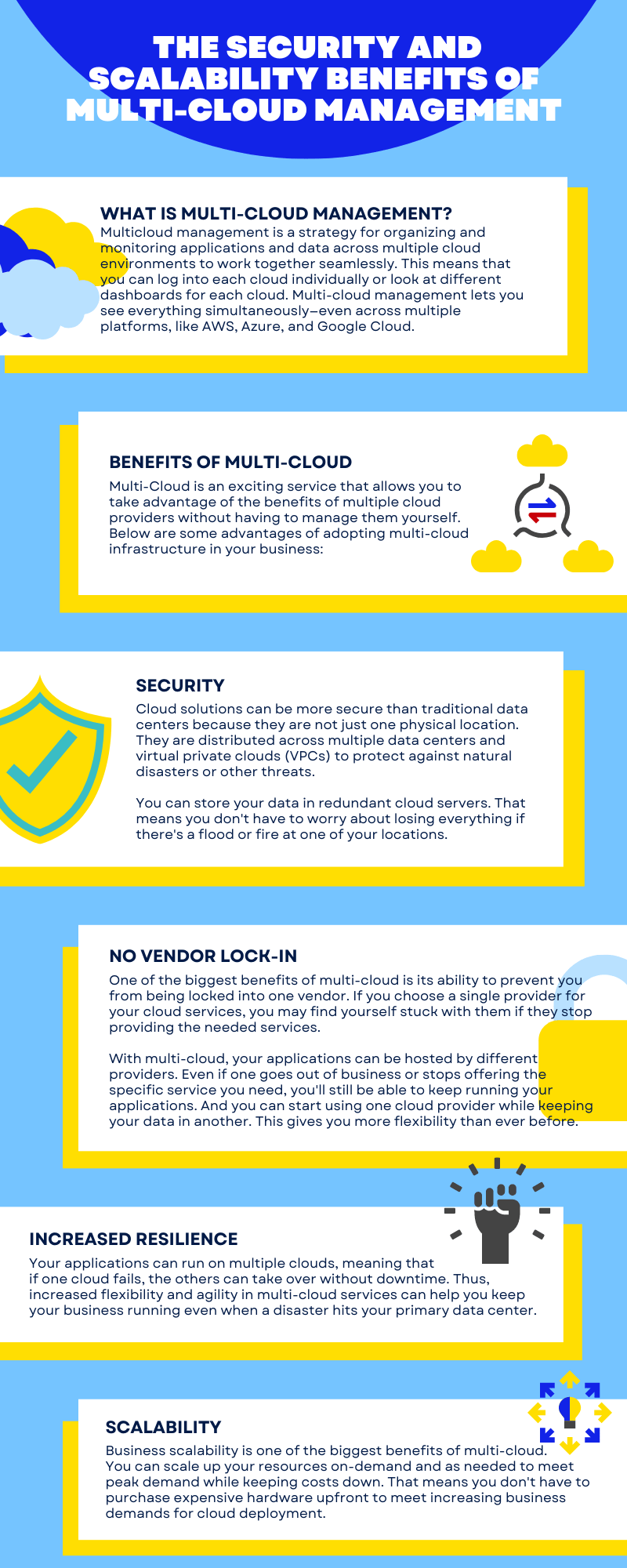Clever businesses are adopting multi-cloud strategies to support their digital transformation, allowing them to leverage the strengths of each public cloud vendor to achieve greater efficiencies. But managing multiple cloud environments can be complex and time-consuming. This is because a business’s in-house IT professionals might have expertise in managing a particular cloud solution. That means transitioning to multi-cloud management can be daunting for them.
As a result, enterprises need efficient solutions to help them with effective multi-cloud management. This article explores multi-cloud management and its security and scalability benefits.

What Is Multi-Cloud Management?
Multi-cloud management is a strategy for organizing and monitoring applications and data across multiple cloud environments to work together seamlessly. This means that you can log into each cloud individually or look at different dashboards for each cloud. Multi-cloud management lets you see everything simultaneously—even across multiple platforms, like AWS, Azure, and Google Cloud.
Multi-cloud management solutions allow users to create policies, manage workloads, and deploy updates all within one system. They consolidate resources across different providers, which reduces costs and frees up more resources and time for other vital functions.
Benefits and Challenges of Multi-Cloud
Multi-cloud is a term that refers to using multiple cloud services to host different applications. But what does it mean for your business? Well, this approach comes with benefits and challenges. Let’s look at both.
Multi-Cloud is an exciting service that allows you to take advantage of the benefits of multiple cloud providers without having to manage them yourself. Below are some advantages of adopting multi-cloud infrastructure in your business:
Security
Cloud solutions can be more secure than traditional data centers because they are not just one physical location. They are distributed across multiple data centers and virtual private clouds (VPCs) to protect against natural disasters or other threats.
You can store your data in redundant cloud servers. That means you don’t have to worry about losing everything if there’s a flood or fire at one of your locations.
No Vendor Lock-In
One of the biggest benefits of multi-cloud is its ability to prevent you from being locked into one vendor. If you choose a single provider for your cloud services, you may find yourself stuck with them if they stop providing the needed services.
With multi-cloud, your applications can be hosted by different providers. Even if one goes out of business or stops offering the specific service you need, you’ll still be able to keep running your applications. And you can start using one cloud provider while keeping your data in another. This gives you more flexibility than ever before.
Increased Resilience
When you’re running a business, you never know when an unexpected outage will hit. You must prepare for anything, ensuring your cloud solutions are as robust as possible.
Luckily, multi-cloud solutions can help you do that by providing the industry with the highest level of resilience. Your applications can run on multiple clouds, meaning that if one cloud fails, the others can take over without downtime. Thus, increased flexibility and agility in multi-cloud services can help you keep your business running even when a disaster hits your primary data center.
Scalability
Business scalability is one of the biggest benefits of multi-cloud. You can scale up your resources on-demand and as needed to meet peak demand while keeping costs down. That means you don’t have to purchase expensive hardware upfront to meet increasing business demands for cloud deployment.
Multi-cloud management enables you to move resources between clouds so that the same infrastructure can be used across multiple cloud providers. This flexibility also gives you more control over what kind of resources you use and how much they cost!
The Challenges of Multi-Cloud
Adopting a multi-cloud strategy also comes with challenges for your business. Below are some of them:
Increased Complexity
Increased cloud complexity is one of the greatest challenges of moving to a multi-cloud environment. It’s not just about managing your infrastructure and applications but also how all those systems interact.
You have to keep track of every single instance in your environment and ensure all your applications are running smoothly and consistently up-to-date with the latest security patches. And that’s why you need the right multi-cloud management tool.
Need for Multiple Skill Sets
Another challenge is finding the right team of cloud experts to manage your cloud environments. In addition to simply managing the infrastructure that underlies your applications, these experts need to know different types of cloud technology, including SaaS (Software as a Service), PaaS (Platform as a Service), and IaaS (Infrastructure as a Service).
Harder-to-manage Costs
Another challenge is cost control. When you use multiple clouds, there’s no single price for each product or service; instead, you’re paying for each cloud independently, which can add up quickly!
How Code Capsules Help with Multi-cloud Security
While adopting multi-cloud is a perfect move for any business, most companies don’t have an IT department large enough to manage all these resources efficiently. Even if they did, it would be difficult for them to keep track of everything. This is where multi-cloud management with Capsules is useful.
Code Capsules provides your business with a simple cloud development and deployment platform that allows you to easily move your code between cloud platforms like AWS, Google Cloud, Microsoft Azure, Plus One X, or custom cloud. The tool helps you avoid vendor lock-in by allowing you to manage and scale your apps to fit business needs.
With Code Capsules, Your IT team has access to a suite of applications to monitor your apps in a complex multi-cloud environment and debugging solutions. The tool also offers policies and guidance for app deployment and promotion. This capability ensures that your business apps run smoothly in a secure multi-cloud environment.
Plus, Code Capsules provides collaboration tools, so your in-house IT team can work with vendors and remote colleagues to ensure the seamless functioning of the multi-cloud ecosystem.
